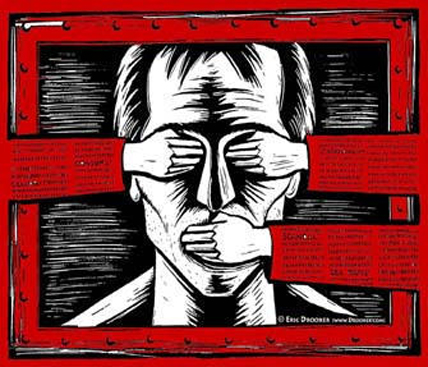Search
Democracy Links
Member's Off-site Blogs
coming to your democracy soon ....

Cabinet Office proposals to expand the use of secret courts will create a "secret justice system straight from the pages of a Kafka novel", an Amnesty International report will warn on Monday.
The report claims that proposals to extend the use of secret evidence will enable the government to "simply play the 'national security' card whenever it wants to keep things secret".
The civil liberties organisation is calling on the coalition government to abandon its justice and security bill, which introduces so-called 'closed material procedures' (CMPs) into the main civil courts in England and Wales.
The procedures – already used in security tribunals – allow sensitive intelligence to be presented to a judge by officials while preventing victims, or claimants, from knowing the allegations against them in full. No date has been set for the bill's next stage in the House of Lords when peers will vote on the controversial measures.
Labour, which says it remains "unconvinced" of the need for reform, is asking for extra time to be made available for debate, the Guardian understands.
Amnesty's report, Left in the Dark: the use of secret evidence in the UK, estimates that CMPs are already used in 21 different legal contexts – including appeals against the imposition of highly restrictive Terrorist Prevention and Investigation Measures [the successor to control orders], and national security deportation proceedings at SIAC, the Special Immigration Appeals Commission.
It poses "a real threat to the principles of fairness and open justice in the UK", Alice Wyss of Amnesty said.
"It's already bad enough that secret procedures have been allowed to creep into the justice system but the government is now trying to extend secret justice to an unprecedented degree."
The report includes interviews with a number of those who have experienced secret justice and still cannot be named. G, a 43-year-old who has been subject to detention under threat of deportation to Algeria over a 10-year period, said: "I want justice: the opportunity to defend myself, in a fair trial … I am not even allowed to know the evidence the state claims to have against me."
Another man, known only as BB, who has been before SIAC, said: "The case against me? It's just a glimpse I've seen. I've never seen enough things for me to explain anything. The closed hearings, I can't go in, my lawyer can't go in."
The Amnesty study concludes that relying "on secret evidence presented to a judge behind closed doors, [runs] … directly counter to ordinary principles of fairness long-recognised in UK law and fundamental to international human rights standards.
"For people caught up in these secret procedures the consequences can be profound, from being deprived of their liberty, to being separated from their family to be returned to a country where they are at real risk of serious human rights violations … Despite the serious consequences at stake, closed material procedures make it incredibly difficult for individuals faced with the secret evidence to effectively respond to the government's case.
"Closed material procedures inevitably fail to properly respect principles of open and adversarial justice … If the justice and security bill becomes legislation in its current form it risks normalising a procedure which can result in violations of the right to a fair trial and the right to effective remedy for victims of human rights violations."
The government argues that the use of secret courts will not result in any cases currently heard in open session going behind closed doors and enable national security disputes that are at present settled to be contested in court.
A Cabinet Office spokesman said: "The point Amnesty have missed is that currently no one, not the claimant, not their lawyers, nor the judge, can take into account or rely on national security-sensitive evidence.
"The result is that cases collapse and we never get to the bottom of serious allegations made against the state.
"The justice and security bill will fix this problem by allowing the national security evidence which is excluded under current rules to be heard in a closed procedure.
"Closed justice is never ideal but it is better when the alternative is silence."
- By John Richardson at 15 Oct 2012 - 4:33pm
- John Richardson's blog
- Login or register to post comments
Recent comments
5 hours 1 min ago
4 hours 59 min ago
6 hours 1 min ago
10 hours 6 min ago
13 hours 52 min ago
13 hours 56 min ago
13 hours 59 min ago
1 day 3 hours ago
1 day 4 hours ago
1 day 4 hours ago